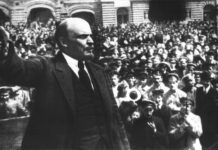The referendum of June 23rd 2016 in the UK on membership of the European Union is of major importance. A ‘Brexit’ will be helpful to the struggles of the workers and peoples of the EU and the continent. This is an article for the latest issue of Unity&Struggle, the biannual magazine of the International Conference of Marxist-Leninist Partiers and Organisations CIPOML.
By the Workers’ Communist Party of Denmark – APK

The European Union moves from one crisis to the next, turning out as a ‘failed project’. Popular support has been steeply decreasing. The desire in many countries to leave it has been growing, and in many countries popular movements to leave the EU and the euro are gaining strength. This has caused reformist forces as the Party of the European Left and others to develop plans and initiatives to ‘save the union’.
The project of the ‘United Europe’ is an offspring of monopoly capital, and has foremost been strongly promoted by the big powers of the continent – such as reunited Germany and France. The ambition has been to create a new imperialist superpower, based on ‘an ever closer union’ of the member countries, with its own currency, legal and political framework, political, economic and military bodies – with a single market, ‘external borders’ and free passage of the old borders between the member countries (‘Schengen’). The plan is to conclude the establishment of the ‘United States of Europe’ by 2025.
Since the outbreak of the capitalist world crisis in 2007- 08 it has been obvious that the German chancellor is the most powerful figure of the ‘United Europe’. The introduction of the euro and the provisions of the single market as well as the legislation in many areas has increased the uneven development of the various countries, making Germany stronger and richer, and impoverishing weaker ones. 70-80 percent of the legislation passed in the national parliaments are adaptions of laws and directives of the EU, that has ‘neoliberal’ economic policies as a fundamental part of its treaties.
All this had combined with the bailouts of the banks at the peak of the economic crises and later led to a rapid widening of the gap between rich and poor, and richer and poorer countries. The profits of the monopolies soar even in a period of extended stagnation. Millions of workers are unemployed, social benefits have been mercilessly cut back. Hunger and child poverty are becoming everyday phenomena. The extension of the ‘free trade’ zones, if CETA, TISA and TTIP agreements between the EU and the US and other countries are concluded, will further accelerate the social polarization.
The European Union has no strong foundations and is not yet the ‘United States of Europe’ with an undisputed president and European government. When it is hit by crisis of any kind – economic, social, political – they tend to paralyse the system and expose the weakness. In the global context of increased global imperialist rivalry between the big world powers, of endless wars, turning millions of people into refugees, and increased terrorism, also hitting the capitals of EU, the workers and peoples of the EU countries are loosing whatever trust they might have had in the project.
The peoples in the EU are also loosing trust in the bourgeois, liberal, social democratic and reformist parties that have embraced each other as partners in the construction of the ‘ever closer Union’ – as tools of the class of capitalists.
The social democratic and socialist fairy tales of the European Union as a ‘good’ superpower and of the possibility to transform it into ‘a social union’ beneficial to the workers have lost credibility. This has led to a strengthening of the workers’ resistance and broader popular resistance to the EU Project, but also to a strengthening of right wing nationalist movements, that are sceptic towards or against the union.
From its very beginning class conscious workers, trade unions and political organizations have been fighting against the class policies of the EU. The peoples have expressed their resistance to the development of ‘the ever closer Union’ and the Project of the United States of Europe also in various referendums, rejecting a number of treaties. Whenever the peoples are asked in referendums, the governments and the EU establishments fear a new No.
There will be major implications, if the people of UK reject the deal between prime minister David Cameron and the EU fearing a so called Brexit – that Britain leaves. The referendums are the results of the growing popular resistance, if the national constitutions provides for such an opportunity. Norway and Switzerland have voted to stay out of the EU. Iceland has withdrawn its application for membership.
A new resounding No of the Danish people
On December 3rd 2015 a referendum was held in Denmark, that resulted in a new strong No to further integration into the European Union. 53,1 percent of the voters said No, 46,9 percent said Yes. 72 percent of the voters participated.
It was a victory for the people against the ruling class and the building of the United States of Europe. It means that Denmark not automatically will be a part of the supranational Europol and legislation on criminal and civil affairs will remain in the hands of the Danish parliament.
It was the third time, the Danes voted a clear No to the building of and further integrations into the European Union. They said No to the Maastricht treaty in 1992, No to the Euro in 2000 and now No to a change of the status of Denmark in 2015.
– The people voted against the establishment and the coalition of political parties, the employers and the bosses of the trade unions, who hand in hand told them to vote yes, commented Dorte Grenaa, chairman of the Workers’ Communist Party APK. She added:
– It was a No of the working class, of the broad strata of the Danish population. It was a No of the youth. The young generation says No to the EU, No to more European Union, No to the plans of establishing the ‘United States of Europe’.
It was a major defeat of the government of Lars Løkke Rasmussen, who heads a coalition of bourgeois parties, including the infamous right wing Danish Peoples’ Party. The political program of the prime minister and his party was formulated in this way in 2012: “We will bring back hunger”. This out-and-out reactionary government replaces a coalition led by the social democratic prime minister Helle Thorning-Schmidt. At the referendum the government and the social democrats and most of their coalition campaigned for a Yes.
The No vote was not a vote of the political right, as it was presented by the pro-EU parties and some international media, proclaiming it as a triumph for the populist right. It was a no of the people. The social and politically broadly based People’s Movement against the European Union, that is represented in the European Parliament, was also this time a decisive factor in the success of the No-campaign
Can the EU be turned into an instrument of progress?
The trust in the possibility of transforming the EU from an anti-worker, neoliberal imperialist block into a progressive ‘social Europe’ suffered a severe blow in 2015 when the efforts of the greek Syriza-government to escape its enslaving chains of debt collapsed, and it accepted to impose the brutal cuts of the EU, making the Greek people pay and pay over again. The Syriza government refused to follow a road leading out of the Euro and out of the EU.
The Marxist-Leninist parties of CIPOML in Europe clearly rejects the social democratic, reformist and left reformist utopian ideas of the transformation of the neoliberal tool of the ruling classes into an instrument of progress for the workers in Europe or a progressive actor on the global scene. The European Union is the heir of and dominated by the old colonial and war mongering powers.
The statement adopted by the Marxist-Leninist parties in Europe at their regional conference in June 2015 entitled Let us mobilize against policies of austerity and war! Long live international solidarity! concludes:
“Everywhere the consciousness is also growing that it is not possible to change the EU from within into a supposedly progressive institution at the service of peoples.
Therefore, we unconditionally defend the right of the peoples to break with the EU, the euro and all its political and economic mechanisms.”
DiEM25
The effort of the Syriza-government to get a ‘fair deal’ concerning the debt failed miserably, causing headaches among reformist left and trade union forces, that have been the most eager exponents of the ‘Social EU’ in one or another shape. But this loss of illusions did not make the strategists of the reformist left give up on the Project European Union. Instead they are looking for ways to renovate it.
Not only one, but two such bail-out projects have been launched. Both of them originating in Syriza and the Party of the European Left, that had Alexis Tsipras as its candidate for ‘President’ of the EU. This party has a strong representation in the EU-parliament and comprises a good part of the reformist left, such as the German Linke, the French Parti Gauche, Spanish Podemos and the Greek Syriza.
The former Syriza minister Yanis Varoufakis has launched a ’Pan european’ movement called DiEM25 – Democracy in Europe Movement 2025. It declares that it will challenge the ‘EU of the elite’ and transform it into ‘a democratic peoples’ EU.
– The EU no longer serves the people – Democracy demands a new beginning, declares Varoufakis, who claims to have found ‘a third way between the undemocratic technocracy of EU and the impotent cocoons of the nation states.’
Varoufakis dreams of a ‘truly single market, a genuinely level playing field, requires a single legal framework, identical industry, labour and environmental protection standards, and courts that will enforce them with the same determination throughout the single jurisdiction. But this then also requires a common parliament that writes the laws to be implemented across the single market as well as an executive that enforces the courts’ decisions.’
Varoufakis asks if there is a third way to achieve this, and answers: ‘Yes, there is. It is the one that official “Europe”, and some local elites, resist with every sinew of their authoritarian mindset: a surge of democracy, orchestrated by Europeans seeking to regain control over their lives from unaccountable technocrats, complicit politicians and opaque institutions’.
There is nothing new to this. It is the age old reformist dream of democratic and popular take-over of the class institutions of capitalist society and transforming them to their opposites without affecting the economic basis. DiEM25 is the left reformist ‘alternative’ to the United States of Europe by 2025. It has from the beginning support from petty bourgeois liberal and reformist organisations all over Europe. This includes the new Danish Party ‘Alternativet’ (the Alternative), that entered the Danish parliament in the general election of 2015.
Varoufakis imagines democratic control of the institutions of EU among other from full transparency and live-streaming from meetings. Within two years a constitutional assembly of the whole EU should be summoned and a ‘sovereign parliament’ established.
The project of Varoufakis‘ project sounds newer and more radical than it is. In fact it is a kind of repletion of the democratic Obama-like rhetoric and promises surrounding the present EU-institutions at the time of their creation, that have never been fulfilled. And exactly for this reason Varoufakis and consorts are in a hurry. The crisis is deep, there is a need of change right now, for ’a new beginning, because popular support for Project EU is rapidly disappearing.
Tried and failed
Rina Ronja Kari, the representative of the Danish Peoples’ Movement against EU in the EU-parliament, writes:
– Knowing which interests the EU was created to serve, the illusions of Varoufakis and the Alternative of changing the EU from within at best to be without sense. She continues:
– It is said that any change must begin with a recognition of the problem. And if we are to change Europe into something better, we first have to realize, that the European Union in itself is a part of the problem. The EU is not an apolitical institution, that can be shaped and painted as you would like. From its very beginning the EU was created to strengthen the coal and steel industry. Its basic principles – the four so called freedoms – are about the free movement of money, goods, services and of labour power – which is not the same as free movement of human beings.
Even if the utopians, the EU-reformists and former greek ministers of finance should succeed in reducing the democratic deficit of the union, and even if power against all expectations would be transferred from the EU Commission to the elected representatives in the EU-parliament – even in that case the decisions concerning the future course will be limited to proceed faster or slower towards the goal established in the treaty of ‘a successively closer union’.
It could not be said more to the point. Varoufakis’ utopian ‘third way’ is not a stumbling stone on the road of the ‘EU elite’ towards the United States of Europe. The present day capitalist nation states are certainly historically outdated. But so is a capitalist supra state also, even though it will not be ‘complete’ until 2015. The interests of the working class and the great majority are best defended, when supranational institutions such as EU cannot dictate a reactionary policy of social dumping and cut backs, or enforce such projects of the multinationals such as TISA and TTIP.
Plan A & B – Reformist dreams
Yaroufakis’ old party comrades of the European Left are also busy designing a new reformist strategy after the collapse of the failed reform move led by Syriza. This new project is known ad Plan B for Europe and is strongly promoted by one of European Left Partis members, the French Parti Gauche and its leader Jean-Luc Melanchon. According to this platform, launched by a conference in Paris January 2016, Plan A would be to work on national levels in the EU and collectively push to renegotiate all of the treaties of the EU. At the same time is a PlanB to counter the most reactionary and anti-democratic forces of the EU – which means the right forces, and not the monopolies or the governments of Capital.
PlanB calls for ‘strengthening our positions towards their brutal execution of a policy, that sacrifices the majority in the interests of a small minority’, and to ‘uphold again the principle that ‘Europe is about Europeans’.
Further that ‘Currencies are tools to promote distribution of wealth, not instruments of torture or weapons to kill democracy.’
Melanchon adds:
‘If the euro cannot be made more democratic, if they insist in using it to strange the people, we shall rise, look them straight in their eyes and tell them: Do your worst! We are not scared by your threats. We will find a way to secure, that Europeans have a currency, that works for them, not at their expense.’
The rhetoric is at high levels. But Plan A and B are just about as concrete and realistic as DiEM25. They are products of the same reformist strategy, all of them predestined to fail. In the end they only serve to slow down the development of the resistance towards the Project EU of the monopolies by refreshing the illusions of the possibility of changing it in a progressive way, instead of working to throw it in the dustbin of history.
The social democrats transferred their national class collaboration strategies to the European Union with the promise of a ‘social Europe’, where the workers’ rights are respected and their positions strengthened. This project has collapsed even more visibly and much faster than their national projects such as the Nordic welfare states, that are now destroyed in the neoliberal European Union.
Class conscious workers, genuine socialists, communists and revolutionaries cannot be supporters of the European Union of the monopolies, of its supra state institutions and its failed currency. Not in any form or shape. The United Capitalist States of Europe is and will remain a reactionary project.
This is a contribution for Unity & Struggle no. 32, April 2016
The English edition is in print See the Spanish edition in pdf here
KPnet 2. juni 2016
Dette er en artikel fra KPnet. Se flere artikler og følg med på
KPNET.DK – NYHEDER HVOR DER KÆMPES – eller på FACEBOOK
Udgives af APK – Arbejderpartiet Kommunisterne







